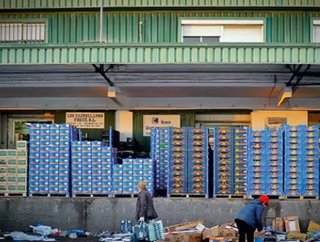Summit calls for greater Supply Chain efficiencies

A summit held last week on the nature of sustainable foods in the modern environment has called for greater efficiency in the food supply chain as one of the key attainable goals of the coming years.
The third North American edition of the Sustainable Foods Summit, hosted in San Francisco, has pledged that more needs to be done to ensure efficiencies in food supply chains. The summit brought together over 160 senior executives from the food industry. A number of speakers highlighted the inefficiencies in food production, distribution and consumption.
The growing move towards locally grown food is increasing the number of community supported agriculture projects in the US. In her paper, Liz Young from Local Harvest highlighted the positive impact such projects can have on farmers and local communities. The pro-GM labelling movement is also gaining ground in the US. According to the Non-GMO Project, prop 37 did not pass in California because of low funding and consumer confusion. However, Courtney Pineau believes the proposed bill has propelled the ‘Right to Know’ movement, with a rise in campaigning expected this year.

The impact of new technologies on the sustainable development of the food industry was the subject of the final session. James Clark, founder of Room 214, explained that consumers are becoming more connected to each other by social media, yet less connected to the environment. Describing this as the ‘dark side of social media’, he encouraged more transparency in social media communications for sustainable products. Other papers covered mobile communications, online distribution, novel production methods, and food authentication tools. In light of the growing number of fraud cases in the food industry, Global ID described the use of chemical fingerprinting to detect food origins, species and quality.
The 3rd North American edition of the summit covered a wide and diverse range of subjects on sustainability and eco-labeling in the food industry. Many new questions have emerged from the summit: What practical methods can make the food industry more efficient? What steps can be taken to improve infrastructure for landfill diversion and / or food recovery programs? What can be done to encourage innovation from food waste and food by-products so there are zero-waste systems? How will new technologies impact eco-labels and supply chains in the coming years? Will eco-labels continue to proliferate or will there be some rationalization? Such questions will be addressed in upcoming editions of the Sustainable Foods Summit.
- Walmart's food safety solution using IBM Food Trust built on the IBM Blockchain PlatformTechnology
- Smithfield Foods sees 80% of its grain supply chain partners achieve greater sustainabilityDigital Supply Chain
- IBM 5 in 5: Five key technologies set to disrupt the food supply chainTechnology
- Christmas and the food supply chain: 5 food procurement tips during busy periodsProcurement






